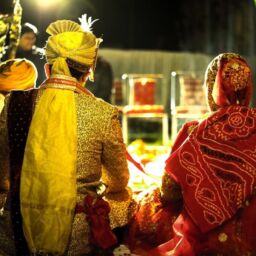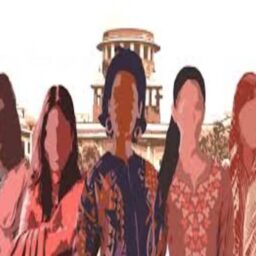INTRODUCTION
Abortion in simple terms means ceasing a pregnancy artificially, in the early stage. Abortion, in the ancient time has always been considered as a Taboo and heinous crime, resulting in social exploitation of the woman and the family. It was considered as a murder of the fetus and taking away his basic right, Right to livelihood.
RELIGIOUS TAKE ON ABORTION (HINDUISM)
Hinduism, which is majorly followed in India, does not promote abortion and term it as ‘Garbha Bhatta’ (womb killing) ‘Bhrunaghna’ (killing the fetus or the underdeveloped soul). It believes that the basic goal of life is to make liberate the soul from the process of rebirth and abortion becomes a destruction to this natural phenomenon.[1] A child is considered as a gift from God and shall not be aborted under any circumstances. The religious preachers downgrades the idea of pro-choice in comparison to pro-life. However, it is to be noted the condemnation of abortion by Hinduism is not absolute and comes with limitations. Furthermore, the general public, in most cases does not see the religious belief as the soul guidance to the concept of abortion in general public. An evil side of abortions also prevails in the society, largely the rural sector which is the sex selective abortions. However, that shall not play the advocate of the pro-life side.
SOCIETAL ON-LOOK OF ABORTION
A female goes through various complications from the time of thinking about abortion till the later consequences of it. Living in a society where sex and topics related to sex is condemned as taboo, talking about abortion raises a lot of fingers on the moral values of the female no matter under what conditions she takes such decision. The society views that the mother could any day give the child for adoption if she cannot financially or emotionally support him or her, even if the child faces traumatic experience and never have a normal childhood life.
The society, even in the modern era perceives pregnancy to be completely controllable and a woman cannot get pregnant if she doesn’t wish to or until she isn’t ready. So abortion, naturally is an artificial and unnecessary hurdle in this holy phenomena. They cover their eyes and ears to the brutal truth behind pregnancy. Unplanned pregnancy isn’t something they consider worthy enough to talk or discuss about and label the women, indolent and foolish to not cherish the holy gift from god even if that mentally, physically and financially drains her and her family.
More than half of the pregnancies around the world are unplanned. The couple at times aren’t mentally or financially in a position to afford a decent livelihood for the child. Some are pregnant due to non-consensual sexual activities and others, a part of an incest relationship. Few of them have biological implications to be able to conceive baby without any threat to the life of the mother or the fetus.
With the change in time, sex education is given in schools (few) but they are limited to biological intimation between a man and a woman, a bit stereotypical and homophobic too. But sex as a whole is more than that. Many people in India don’t even know how to carry out safe and protected sex, which isn’t safe and protected completely.
LEGAL RIGHTS ON ABORTION
After dealing with the society’s perception on the issue, we shall look upon the legal aid provided in our country. The first law that was drafted against the matter in hand was from “Section 312 to 316 under Indian Penal Code of 1860”, followed by the “Medical Termination of the Pregnancy Act 1971”
Abortion Act under IPC 1960
the basic focus of the act from section 312 to 316 are focused on the miscarriage. It has openly termed induced abortion as a part of the criminal offense with an exception of saving the mother’s life. Section 312 clearly states that whoever, be it the mother causes miscarriage in not good faith shall fall under this section. The word abortion has been swiftly replaced by miscarriage to avoid hurting the religious sentiments.[2] The only exception that is provided under this section is when the life of the mother is in danger and under no circumstances can she conceive a healthy baby without a threat to her life.
The other section of the IPC follows a similar pattern with regards to the miscarriage of the baby and the threat to life of the mother and what shall be the legal implications to such act.
Medical Termination Act of 1971
The MTA act officially legalized the abortion of India that would be followed throughout the country other than the erstwhile state of Jammu and Kashmir. According to section 3 part 2, termination of pregnancy was legalized up to 12 to 20 weeks of pregnancy in good faith. Pregnancy after 20 weeks shall be strictly prohibited. The practitioner, under no circumstances shall be held liable if he/she follows the regulations provided under the act. It is to be noted that pregnancy cannot be terminated in places that aren’t licensed to carry out the operation.
CONCLUSION AND SUGGESTIONS
Very few countries, all around the world have legally permitted the right to abortion. To conclude, A woman has to go through ample changes before, during and after pregnancy that could even lead to clinical depression at any stage. She shouldn’t be told by the society and morality preachers either to conceive a baby or not. Researches have shown that women, in most cases tend to develop an emotional attachment to the fetus at a very early stage and terminating the process could cause serious psychological implications on her. Since, the women have to carry the major burden of the consequences of pregnancy and abortion, she shall be given rights to decide for herself that would be in line with the act’s rules and regulations.
Keeping pro-choice above pro-life isn’t violation of any rights as right to life is guaranteed to person and fetus can legally enjoy this right only after the fifty seventh of the fertilization under PCPNDT Act. (Pre-natal Gender Screening Warning)
My suggestions to the topic of abortion is that women should have the liberation to decide for herself if she wants to conceive or not. A father’s input can be taken into consideration however it shouldn’t be imposing. It is, ultimately a female who has to bear with maximum consequences, not the family, not the society and not the state. The hospitals should take written consent of the woman before anybody else’s. Abortion takes a lot of mental toll on the woman. Therefore, there should be a system to make the woman visit a counsellor before the abortion to make her mentally prepared for it and to make sure she isn’t being forced into it as well.
Author(s) Name: Iva Mehta (Student, NMIMS Bangalore)
[1] Hindu Human Rights, https://www.hinduhumanrights.info/hindu-religious-quotes-on-abortion/ (last visited June 13, 2021).
[2] K. D. Gaur, Abortion and the law in India, Vol. XV, Cochin University Law Review, p. 123-143, 1991.
















